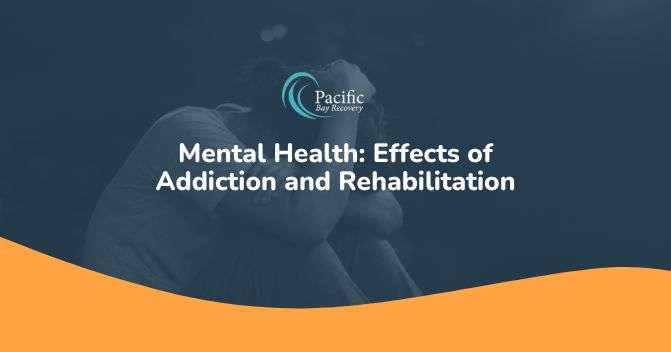If you or a family member is experiencing a problem with addiction, there are a few critical facts to know concerning the effects of addiction on mental health. The following blog is written to educate people presently experiencing addiction, in addition to those who know somebody experiencing addiction, about how addiction and substance abuse impact the brain, the mental health impact of alcohol and drugs, as well as how you can take action towards recovery.
How Does Drug Addiction Affect the Brain?
If you think you’ve seen a change in your own or within another individual’s behaviors, thought patterns, or emotional state after or during substance use, you’re probably right. Addiction affects the brain on several levels. For instance, alcohol is a depressant causing disturbances in the balance of the brain that affects actions, feelings, and thoughts – and occasionally our long-term mental health. Once we use alcohol, sedatives, opioids, or stimulants, the chemical compounds enter our bloodstream or brain. When a chemical enters our brain it may cause individuals to crave a harmful substance or lose control of their impulses. Drugs can alter nerve cells that usually process, receive, and send information, referred to as neurotransmitters.
They’ll do that by:
- Imitating the brain’s natural chemical messenger
- Overstimulating the brain’s “reward circuit”
- Flooding the brain with excessive chemicals
- Binding to brain’s receptors
Basically, drugs and alcohol disrupt the way neurons usually work.
How Does Addiction Affect Mental Health?
The psychological distress related to substance abuse may range from mild to severe. It is not clear which problem is causing the other; however, the relationship is solid, nonetheless. Those suffering from anxiety or mood disorders are nearly two times as likely to also experience a substance abuse disorder, and those suffering from substance abuse disorders are roughly two times as likely to additionally suffer from an anxiety or mood disorder.
Also, people frequently abuse substances as a method of self-medicating mental health problem symptoms which oftentimes may increase the risk for mental health disorders in addition to triggering new symptoms. If you or a family member is chronically using alcohol or drugs it may lead to brain changes, which may lead to mental health problems, which include depression, paranoia, anxiety, hallucinations, aggression, and other issues.
Drugs and Stress: How to Deal with It?
It is not possible to totally rid yourself of stress; however, you may use any of the below ways to assist in reducing the frustration felt.
Create Healthy Routines: Routines help us concentrate on the next step; not on our present frustrations. For instance, if you set a routine for sleeping, working, eating, or attending school, your day will flow well and your mind is at peace. If the days become disjointed, with various tasks taking place at different times each day, stress accumulates. To assist in preventing such stress, set up healthy routines and stick to them as much as you can.
Exercise Your Frustration Away: All throughout your recovery, you’re certain to occasionally feel anxious and overwhelmed. Frustration is an element of change. Though, it does not need to fuel a relapse. Put it to good use for yourself, instead. In exercising, you can work away the adrenaline and tension from stress, which leaves you in a calmer state. Also, you will feel as if you achieved something.
Try Meditation: Meditation enables you to move from a space of pain and anger to a space of well-being in which you feel at ease about yourself and the life around you. It also is very effective when you’re suffering from substance cravings. Once you’re still and focusing on breathing, it is possible to permit negative feelings and thoughts to flow through you without having to react to or judge them.
Figure Out a Way to Have Fun: Discovering activities you enjoy may help to quit concentrating on your day-to-day levels of stress. For instance, some folks might love to spend time with friends. So, try hosting a little get-together at your house, where it’s safe. If you like music, find a music group in your area to join or listen to. Get involved in something that is new to you.
What to Do and How to Find the Right Rehab Center
Stress is not ever going to go away completely; however, it is possible to learn how to manage it successfully. Ongoing support and treatment from the team at Pacific Bay Recovery provide the tools necessary to minimize and contain stress.
For more information on how drug addiction affects the brain and other questions you may have, please get in touch with our Los Angeles Rehab Centers today at (619) 350-8220.


